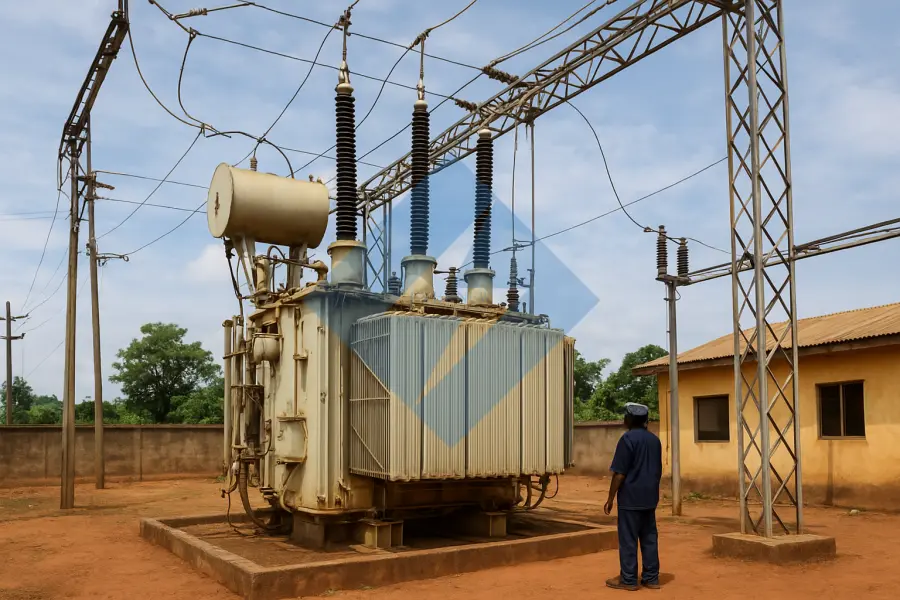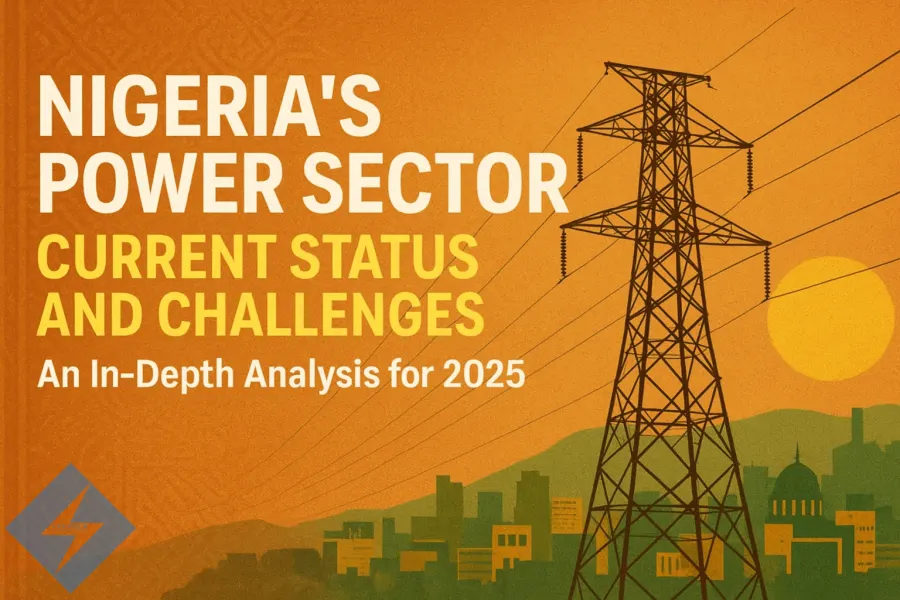Nigerijský energetický sektor se nachází v kritickém bodě, který se vyznačuje souběhem protikladů a transformací. Nigérie je největší africkou ekonomikou a nejlidnatější zemí, a proto stav jejího elektroenergetického sektoru přímo ovlivňuje národní hospodářský růst, industrializaci a životní úroveň. Navzdory tomu, že vláda v nedávné době zavedla řadu reformních opatření, se odvětví s výhledem do roku 2025 nadále potýká s dvojím tlakem dlouhodobých strukturálních problémů a makroekonomické nestability.
I. Současný stav odvětví: Hledání průlomů uprostřed problémů
1. Výrazná nerovnováha mezi nabídkou a poptávkou a neefektivita
Spotřeba elektřiny na obyvatele v Nigérii zůstává pozoruhodně nízká a je hluboko pod celosvětovým průměrem. Přestože plynová energetika se na celkové výrobě podílí více než dvěma třetinami, skutečné dodávky elektřiny koncovým uživatelům jsou značně omezené kvůli slabé infrastruktuře, omezením dodávek plynu a obrovským ztrátám při přenosu a distribuci (vysoké souhrnné technické, obchodní a sběrné ztráty - ATC&C).
Generační mix: Od roku 2024-2025 je výroba energie silně závislá na fosilních palivech (především zemním plynu), což vytváří znatelnou mezeru oproti celosvětovému trendu přechodu na čistou energii. Hlavním zdrojem nízkouhlíkové energie zůstává vodní energie.
Přístupová výzva: Více než 80 milionů Nigerijců stále nemá přístup k elektrické síti. I ti, kteří jsou připojeni, se často potýkají s nedostatečnými dodávkami a opakovanými kolapsy národní sítě.
2. Reformy trhu a zákon o elektřině z roku 2023
Přijetí zákona o elektřině (EA) 2023 je klíčovým reformním milníkem, který zásadně změnil strukturu řízení energetiky v zemi:
Decentralizace: Zákon dává státům pravomoc vytvářet a regulovat vlastní trhy s elektřinou, čímž se odklání od předchozího centralizovaného řízení federální vládou. To otevírá možnosti podpory přístupu k energii a energetické účinnosti na místní úrovni.
Přechod na nový trh: Nigerijský průmysl dodávek elektřiny (NESI) přechází na dvoustranný obchodní systém, čímž se postupně eliminuje role Nigerijské společnosti pro hromadné obchodování s elektřinou (NBET) jako jediného zprostředkovatele. Cílem tohoto kroku je zlepšit efektivitu a transparentnost trhu.
Regulační rámec: Nigerijský nezávislý systémový operátor (NISO) byl zřízen za účelem posílení řízení a provozu sítě.
Více informací:Bezvětrná skříň s transformátorem 500 kVA: bezpečné, efektivní a kompaktní řešení napájení od společnosti Evernew Transformer

II. Hlavní výzvy: Hluboce zakořeněné problémy bránící růstu
1. Krize likvidity a fiskální zátěž
Na stránkách dlouhodobý problém s likviditou je nejzávažnějším problémem, kterému nigerijský energetický sektor čelí.
Dotace a dluh: Energetické společnosti jsou zatíženy obrovskými nedoplatky a vláda čelí tlaku na reformu režimu spotřebitelských dotací. To přímo ohrožuje finanční zdraví výrobních společností (GenCos), přenosových společností (TransCos) a distribučních společností (DisCos).
Přezkum tarifů: Racionalizace tarifní struktury a zvýšení cen elektřiny je nezbytné pro řešení krize likvidity, ale často naráží na společenský a politický odpor, což zvyšuje riziko hospodářské nestability.
2. Nedostatky v infrastruktuře a bezpečnostní problémy
Úzká místa T&D: Stárnoucí a křehká síťová infrastruktura vede k extrémně vysokým technickým a obchodním ztrátám, což omezuje efektivní přenos vyrobené energie. Nestabilita napětí a časté výpadky sítě jsou hlavními technickými problémy, které trápí celé odvětví.
Vandalismus a krádeže majetku: Činnosti, jako jsou manipulace s elektroměry, krádeže elektřiny a vandalismus na přenosové infrastruktuře, vážně snižují příjmy společností DisCos a prohlubují jejich finanční potíže.
3. Riziko dodávek paliva a makroekonomické šoky
Zásobování plynem: Navzdory velkým zásobám plynu vedou nedostatečná infrastruktura plynovodů, bezpečnostní problémy (např. sabotáže na plynovodech) a problémy s dodržováním smluv často k tomu, že "nedostatek plynu," brání plynovým elektrárnám v provozu na plný výkon.
Forex a inflace: Makroekonomická nestabilita, zejména znehodnocení nairy a vysoká inflace, zvyšuje náklady na dovoz zařízení a nákup plynu, což zvyšuje kapitálové a provozní výdaje na energetické projekty.
Více informací:Průvodce schématem výkonového transformátoru pro kupující Výběr, instalace a informace o nákladech

III. Výhled do roku 2025 a příležitosti k transformaci
I přes značné problémy se nigerijský energetický sektor aktivně snaží o průlom, zejména v oblasti decentralizace a modernizace sítě.
1. Obnovitelné zdroje a decentralizovaná řešení
Vzhledem k nespolehlivosti rozvodné sítě se stále více prosazují solární a bateriové technologie, což signalizuje strukturální posun směrem k obnovitelným zdrojům energie.
Off-grid a minigrids: Decentralizovaná řešení výroby elektřiny, jako jsou minisítě a malé solární systémy, se stávají životaschopnou možností, jak vyřešit problémy s přístupem k elektřině ve venkovských a odlehlých oblastech a účinně obejít křehkou vnitrostátní síť.
Plán přechodu na energetiku (ETP): Nigerijská energetická politika upřednostňuje rozvoj obnovitelných zdrojů energie a poskytuje politický rámec pro přilákání investic do čistých energetických technologií.
2. Modernizace sítě a možnosti mezinárodního partnerství
Nigérie naléhavě potřebuje modernizovat svou přenosovou a distribuční infrastrukturu, aby snížila ztráty a zvýšila stabilitu sítě. To představuje obrovskou tržní příležitost pro vysoce kvalitní mezinárodní poskytovatele zařízení a služeb.
V této souvislosti Evernew Transformer, špičkový produkt Čínský výrobce výkonových transformátorů a velkoobchodu, má významnou výhodu. Společnost může dodávat celou řadu výrobků na míru. výkonové transformátory od 6 kV do 500 kV s výkonem až 1200 MW. Díky výrobkům certifikovaným podle různých mezinárodních norem, včetně CE, UL, CDA a GOST, má společnost Evernew Transformer dobrou pozici pro podporu rozsáhlých nigerijských projektů v oblasti výroby, přenosu a průmyslu elektrické energie:
Dodávky kritického vybavení: Ambiciózní projekty modernizace a rozšíření rozvodné sítě v Nigérii, včetně výstavby nových rozvoden a výměny zařízení, vyžadují vysokokapacitní a vysoce spolehlivé transformátory. Technické schopnosti a mezinárodní certifikace společnosti Evernew Transformer zajišťují, že její výrobky splňují přísné požadavky nigerijského průmyslu dodávek elektřiny (NESI).
Podpora potřeb průmyslové energie: S rozvojem nigerijské ekonomiky, zejména ropného a plynárenského průmyslu a zpracovatelského průmyslu, bude poptávka po vysokokapacitních transformátorech na míru i nadále růst. Přizpůsobovací služby společnosti Evernew Transformer mohou účinně uspokojit specializované potřeby těchto průmyslových uživatelů.
3. Regulační a institucionální dividendy
Očekává se, že zavedení zákona o elektřině do roku 2023 vnese na místní trhy s elektřinou novou vitalitu a povzbudí vlády jednotlivých států, aby optimalizovaly své energetické systémy prostřednictvím přísnější regulace a lokalizovaných veřejných zakázek.
Závěr
Při pohledu do roku 2025 stojí nigerijský energetický sektor na kritické křižovatce. Jeho úspěch závisí na účinném řešení dlouhodobé krize likvidity a úzkých míst v infrastruktuře a zároveň na plném využití reformních přínosů zákona o elektřině pro rok 2023.
V budoucnu je třeba se zaměřit na urychlení přechodu na čistší a decentralizovaná energetická řešení a využít partnerství s celosvětově certifikovanými poskytovateli, jako je Evernew Transformer, k rychlé modernizaci a rozšíření sítě. To vyžaduje nejen důslednou vládní politiku a regulační závazky, ale také trvalé a stabilní investice domácího a mezinárodního kapitálu. Pokračující zlepšování nigerijského energetického sektoru je klíčovým faktorem, který rozhoduje o tom, zda největší africká ekonomika dokáže využít svůj obrovský ekonomický potenciál.
Zajímá vás zejména to, jak nová decentralizovaná struktura trhu podle zákona o elektřině 2023 ovlivní roli státních vlád?

